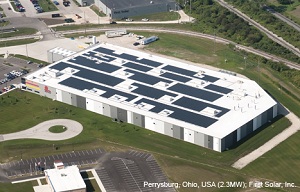First Solar signs 2°C Challenge Communiqué to pressure governments to reduce fossil fuel use
 First Solar Inc. (NASDAQ: FSLR) signed the 2°C Challenge Communiqué, an international effort to hold global warming to a 2 degree Celsius raise. The company signed on as global leaders prepare to discuss climate change in Durban, South Africa, through the United Nations.
First Solar Inc. (NASDAQ: FSLR) signed the 2°C Challenge Communiqué, an international effort to hold global warming to a 2 degree Celsius raise. The company signed on as global leaders prepare to discuss climate change in Durban, South Africa, through the United Nations.
At this point, 342 companies have signed the onto the Communiqué, including CocaCola, Procter & Gamble, Unilever and KLM airlines.
The document urges countries to adopt policies that support clean, renewable energy over fossil-fuel derived energy and to take other actions to curb rising temperatures because of global warming.
“The scientific and economic evidence remains clear. If we do not act, climate change risks seriously undermining future global prosperity and inflicting significant social, economic and environmental costs on the world. If we take the right steps, we can secure a low-carbon-emission economy that is more resilient, more efficient and less vulnerable to global shocks,” the document reads.
First Solar signed on because it wants to see, among other things, an end to subsidized fossil fuels and a stable regulatory environment for renewable energy.
“Businesses need stable regulatory environments with long term visibility,” said First Solar spokesperson Alan Bernheimer. “This allows us to plan ahead and reduces investment risks. Stringent, ambitious, international and national carbon regulation will help develop a sustainable solar market capable of addressing climate change.”
As a solar producer and developer the company would of course benefit from such an environment. But even now it’s working to make its solar products as clean as possible.
“First Solar is committed to managing its product from raw material sourcing to end-of-life collection and recycling,” Bernheimer said. “On a life cycle basis, systems using First Solar modules have the lowest carbon footprint and fastest energy payback time of any PV technology.”
The company also produces solar panels at plants that are powered, at least partially, by solar.
“We have installed PV power plants on the roofs of our manufacturing facilities in Germany and Ohio,” Berheimer said. “The system in Germany is 2.8 megawatts and generates enough electricity to power about 855 average local homes, displacing about 1,916 metric tons of carbon dioxide emissions a year. The rooftop PV system on our Ohio factory is 100 kilowatts and came online earlier this year.”
While solar already is on its way to grid parity with fossil-fuel based generation, companies like First Solar want to see the subsidies extended by countries to coal, oil and gas, which would make such sources of energy more expensive—and reflect their real cost.
And those incentives are heavy.
The United Nations International Energy Agency estimated that fossil-fuel consumption subsidies were $409 billion in 2010, up from $300 billion in 2009.



